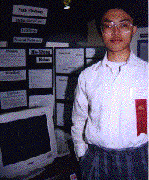Megaconference VIII Call For Interactive Presentations "Interactions" Now On
The world’s 8th annual Megaconference has been scheduled for November 8, 2006 from 8:00 a.m. to 11:00 p.m. (EST). Anyone in the world using H.323 Internet videoconferencing is invited to submit a proposal for what organizers are now calling “interactions,” or interactive presentations.
Megaconference founder Dr. Robert Dixon said videoconferencing is an inherently interactive medium, and to encourage this concept the term “interaction” has been adopted to describe this feature of the Megaconference.
 At the 47th Annual State Science Day on April 22, 1995, the
At the 47th Annual State Science Day on April 22, 1995, the